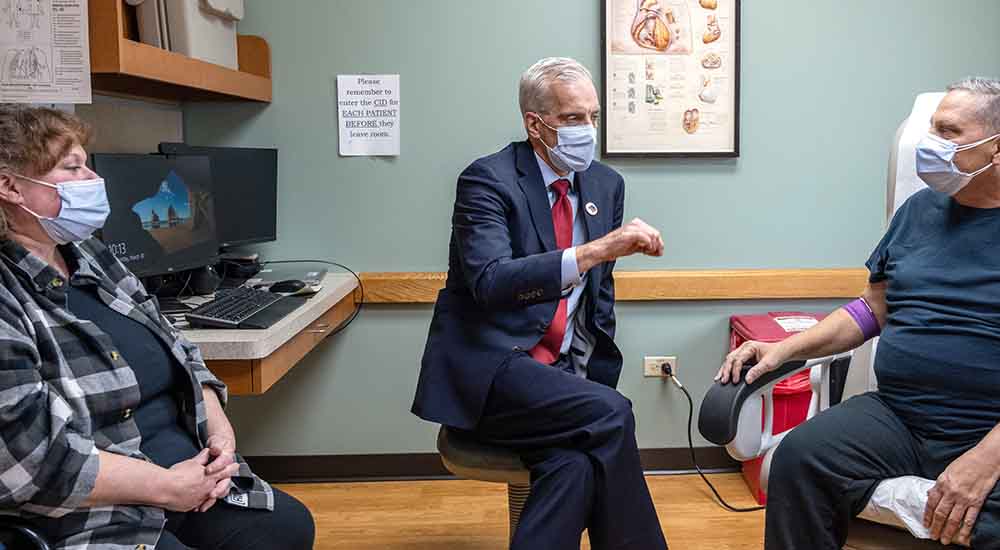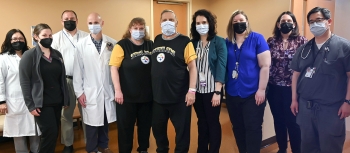More than 90,000 Americans are currently waiting for a kidney transplant. Army Veteran Newton Thomas was one of them.
Five years ago, Thomas’ doctor told him his kidneys were failing and he needed a transplant. Undergoing dialysis three times a week, Thomas waited for a life-changing phone call saying a donor was available.
“It was rough,” he said. “You’re waiting by the phone the whole time. I’ve answered so many telemarketers late at night just hoping it was a call from the hospital.”
On March 13, Newton got that call. The next day he and his wife Sherri flew from Pittsburgh to Chicago to become Edward Hines, Jr. VA Hospital’s 50th kidney transplant recipient.
Completing its first kidney transplant in November 2020, the Hines program is one of eight VA kidney transplant programs.
“The milestone is significant because we were only projected to perform eight to 10 transplants in our first year. We surpassed the goal within our first five months,” said Dr. Reynold Lopez-Soler, program director. “We reached 50 transplants within the first 16 months of the program. “Though the number in and of itself is not significant, it represents the incredible need for a transplant program in Chicago and the amazing work the entire hospital has put in to make it be as successful as it has been.”
First transplant Veteran patient traveled from Iowa
Like Thomas, many Veterans travel to Hines from across the country for treatment, including patients from Puerto Rico, North Carolina and Montana. However, half of the program’s patients are from the Chicago area. According to Dr. Geraldine Zingraf, program administrator, having a nearby transplant program is essential for many Veterans.
“Although transplant programs are nationwide, typically most patients can’t stay out of town for long periods of time, so transplants are not an option,” explained Zingraf. “There are so many patients that qualify for transplants in the Chicago area. Now they can get it done here.”
Area Veterans would travel to Iowa City, Iowa, for the nearest transplant evaluations and surgeries, including Robert Wayne Williams, a Chicago Army Veteran and Hines VA’s first kidney transplant recipient.
“I was on dialysis for six years,” said Williams. “I was traveling back and forth to Iowa. And I was so hopeful when I found out Hines was going to start doing transplants but I never thought I’d be the first.”
A year-and-a-half after his surgery, Williams’ wife Claudette has seen a change grow each day in her husband.
“You can see it in his face. His level of excitement and his momentum. He’s come back alive,” she exclaimed. Three months into 2022, the program has already completed 15 kidney transplants. In 2021, the program’s first full year, Hines led VA in total kidney transplants with 36 successful procedures.
Zingraf credits the program’s quick success to a skilled surgical team and its holistic approach to medicine.
Multidiscipline approach affects overall quality of care
“We do so much more on the outpatient side than the inpatient side,” she explained. “It’s a multidiscipline approach with constant communication. We have specialists in all the areas that can take care of the patient for any need that they may have, everything from their medication questions, dietary needs, psychosocial and clinical issues.”
According to Zingraf, the patient’s overall health and experience improve dramatically by grouping all these individual disciplines into one team.
“Any patient at Hines can have these services individually, but when we bring them all together as a team, it can greatly affect the overall quality of care,” she said.
The program’s whole health approach is quickly noticed by its Veteran patients.
“I had a good feeling about this program, and I could see it in the staff when I came for the orientation,” Thomas said about his first visit to Hines last fall. “I just had this feeling that they could get me the help I needed.”
With living donor transplants expected to begin by early summer, the program hopes to expand its successes even further.
“Our Veterans will be able to get a kidney transplant sooner instead of waiting years for a matching deceased donor,” Zingraf explained. “The living donor transplants numbers will be in addition to the deceased donor transplants we are performing. It will expand our capabilities at Hines and increase our support to Veterans.”
Living kidney donations and the Hines VA’s Kidney Transplant Program are performed in collaboration with Loyola University Chicago Stritch School of Medicine, a VA academic affiliate. According to Zingraf, everyone is encouraged to become a living donor and potentially save a life. To learn more, visit Loyola.DonorScreen.org
“That’s when I’ll realize it’s done!”
As Thomas completes his recovery at Hines VA before returning to Pittsburgh, he’s still adjusting to life away from dialysis and waiting.
“It hasn’t really sunk in yet,” he explained. “I don’t think it will until I get back home and see my dialysis blanket and chair. Just being able to sleep in for the first time in years and not worry about being on a schedule, I think that’s when I’ll realize that it happened. That it’s done.”
According to Thomas, he and Sherri will use their new lease on life to move to Georgia to be closer to their daughter.
“It’s a whole new beginning,” he said.
Learn more about VA’s transplant programs.
Topics in this story
More Stories
The Medical Foster Home program offers Veterans an alternative to nursing homes.
Watch the Under Secretary for Health and a panel of experts discuss VA Health Connect tele-emergency care.
The 2024 National Veteran Suicide Prevention Annual Report provides the foundation for VA’s suicide prevention programs and initiatives.







